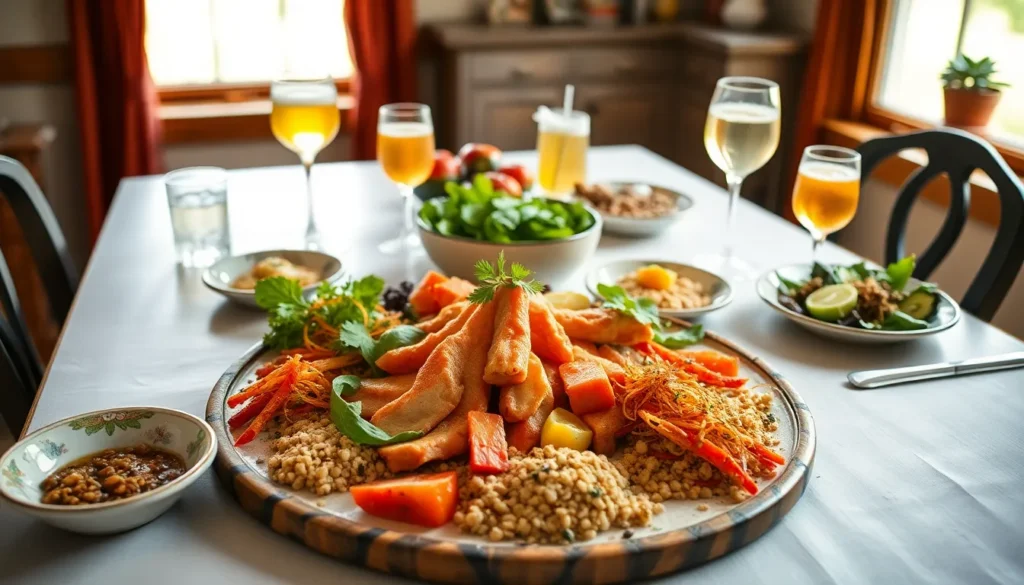Table of Contents
ToggleFamily traditions are the glue that holds loved ones together, creating memories that last a lifetime. From wacky holiday rituals to quirky weekend activities, these unique customs add a splash of joy to everyday life. Imagine gathering around the table for a pancake-eating contest or dressing up the family pet for Halloween—who wouldn’t want to be part of that?
Importance Of Fun Family Traditions
Fun family traditions play a crucial role in strengthening bonds. They create shared experiences that promote unity. Engaging in such activities fosters a sense of belonging among family members. Everyone looks forward to those special moments, enhancing emotional connections.
Regular participation in family traditions builds anticipation and excitement. For example, traditions like annual beach trips or movie nights provide opportunities for laughter and joy. Such rituals not only offer entertainment but also become cherished memories over time.
Emphasizing these unique customs can also teach children the value of family togetherness. Children learn essential social skills through collaborative activities, such as cooking or game nights. These skills often carry into their adult relationships, reinforcing the importance of community and connection.
Celebrating special events with dedicated rituals encourages families to prioritize time together. Whether it’s decorating for the holidays or having themed dinners, these moments strengthen family identity. Engaging in fun traditions also allows families to express values and beliefs, passing them to future generations.
Additionally, traditions offer a consistent source of comfort and security in an ever-changing world. Familiar customs provide stability and a sense of routine. Actively participating in family traditions can help individuals navigate challenges by creating a reliable support system.
Ultimately, fun family traditions enhance relationships and create lasting legacies. They help families bond while creating a strong foundation for future connections. Maintaining these practices ensures that families remain closely knit and deeply connected, establishing memories that last a lifetime.
Types Of Fun Family Traditions

Family traditions manifest in various forms, enriching lives through shared experiences. Each tradition contributes uniquely to family ties and cherished memories.
Seasonal Traditions
Seasonal traditions create annual rituals that families anticipate together. Activities like decorating a Christmas tree or carving pumpkins for Halloween bring excitement. Families often engage in springtime egg hunts, fostering joy and community spirit. Outdoor family picnics during summer afternoons serve as a backdrop for bonding. Celebrating these seasonal milestones reinforces unity and creates lasting memories across generations.
Cultural Traditions
Cultural traditions provide a way for families to connect with their heritage. Celebrating holidays such as Diwali or Hanukkah deepens understanding of customs and values. Families may also gather for specific rituals, such as festive meals that highlight traditional dishes. Sharing stories and customs enriches the family’s identity and fosters pride. Engaging with cultural practices also promotes inclusivity and respect for different backgrounds.
Everyday Traditions
Everyday traditions introduce fun into daily routines. Weekly family game nights offer an opportunity for laughter and competition. Preparing a family meal together cultivates teamwork and communication skills. Routine activities like nightly bedtime stories strengthen bonds and create a safe environment. Even simple daily rituals, such as weekend brunches, enhance connections and build a reliable framework for family life.
Creating Your Own Fun Family Traditions
Creating unique family traditions enhances connections and strengthens relationships. Families can design rituals that accommodate everyone’s interests and preferences.
Involving Everyone In The Process
Engaging each family member in the tradition-building process fosters excitement and inclusiveness. Brainstorming ideas together allows individuals to share their preferences and contribute to the tradition. Voting on choices ensures everyone feels involved in the decision-making. Establishing rotating responsibilities gives each person a sense of ownership and pride. For example, one week a child might select the weekend activity, while another might pick the family movie for movie night. Ultimately, active participation creates a sense of unity and anticipation among family members.
Making It Meaningful
Meaningful traditions resonate with shared values and experiences. Identifying what matters most to the family lays the groundwork for impactful rituals. Celebrating accomplishments, such as academic achievements or milestones, strengthens bonds. Integrating family stories into traditions connects past generations with the present. For instance, recounting favorite memories during a specific meal turns dinner into a cherished event. Choosing a community service project as a family reinforces the importance of giving back. Therefore, traditions that reflect core values cultivate deeper family ties and lasting memories.
Benefits Of Maintaining Family Traditions
Maintaining family traditions fosters strong emotional connections among members. Shared activities create lasting memories, reinforcing bonds that withstand life’s challenges. Consistent participation in traditions teaches children social skills like cooperation and communication, essential for healthy relationships.
Additionally, rituals provide families with a sense of identity and belonging. Participating in seasonal traditions during holidays, like decorating a Christmas tree or lighting candles during Hanukkah, cultivates shared experiences that families cherish. Engaging in cultural celebrations, such as Diwali, helps families maintain their heritage and promotes inclusiveness.
Regular gatherings centered on everyday traditions, like weekly game nights or shared meals, introduce joy into daily life. These moments encourage families to prioritize time together amidst busy schedules. In contrast, special occasions, including family reunions or birthdays, allow families to celebrate each member’s achievements, reinforcing positive values.
Moreover, familiar customs offer comfort in an ever-changing world. Knowing that certain traditions will occur regularly provides stability. Family members can rely on these experiences for emotional support, especially during difficult times.
Research indicates that families with strong traditions experience greater feelings of happiness and closeness. Such families often report higher satisfaction in their relationships. Engaging in these activities can enhance overall well-being.
Passing down traditions connects generations, ensuring that family values endure. This continuity instills a sense of pride and responsibility in children, showing them the importance of maintaining family ties. Ultimately, family traditions are vital to nurturing close-knit relationships and creating treasured memories that last a lifetime.
Fun family traditions are more than just enjoyable activities; they’re the threads that weave families together. By engaging in these shared experiences, families can cultivate deeper connections and create a treasure trove of memories that last a lifetime.
As families explore new traditions or cherish existing ones, they foster a sense of belonging and joy that enriches daily life. These rituals not only strengthen bonds but also instill values that can be passed down through generations. Embracing the spirit of tradition can transform ordinary moments into extraordinary memories, ensuring that family ties remain strong and resilient.




